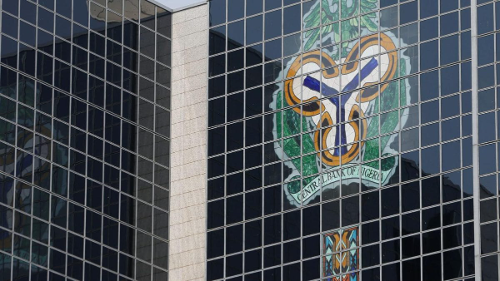Nigeria hikes interest rate by 400bps in major push to curb inflation

TLDR
- Nigeria's central bank raised interest rates by 400 basis points to 22.75% in efforts to combat inflation and stabilize the currency.
- Other measures implemented include raising the cash reserve ratio from 32.5% to 45% and adjusting parameters for banks' funding and lending activities.
- Lenders will now face changes in borrowing rates and returns on deposits, aimed at tightening liquidity in the financial system.
Nigeria's central bank took decisive action in its first policy meeting since July, announcing significant increases in interest rates aimed at addressing soaring inflation and stabilizing the country's currency. Governor Olayemi Cardoso, along with the other members of the monetary policy committee, raised the benchmark rate by a substantial 400 basis points to 22.75%.
In addition to raising interest rates, the central bank implemented other measures to tighten liquidity. They increased the cash reserve ratio from 32.5% to 45% and adjusted the parameters governing banks' funding and lending activities.
Lenders will now borrow at a rate 100 basis points higher than the monetary policy rate, while the return on their deposits will be 700 basis points lower than the benchmark, a change from the previous 300 basis points difference.
Key Takeaways
The Monetary Policy Committee (MPC) has implemented an unprecedented series of interest rate hikes, totaling 1,025 basis points, since May 2022. These measures aim to address soaring inflation, which reached nearly three-decade highs of 29.9% last month, and stabilize the Nigerian naira. The currency has experienced a significant depreciation of approximately 70% against the US dollar during this period. The depreciation of the naira can be attributed largely to multiple devaluations of the currency since June of the previous year. These devaluations were part of efforts to unify Nigeria's official and unofficial exchange rates, aimed at attracting investors and alleviating a shortage of dollars in the country. President Bola Tinubu initiated these measures shortly after assuming office in May, which included easing currency controls and eliminating fuel subsidies, to stimulate economic growth. While these actions were welcomed by international investors, they have also sparked protests in various provinces across Nigeria.

Next Frontier
Stay up to date on major news and events in African markets. Delivered weekly.
Pulse54
UDeep-dives into what’s old and new in Africa’s investment landscape. Delivered twice monthly.
Events
Sign up to stay informed about our regular webinars, product launches, and exhibitions.




